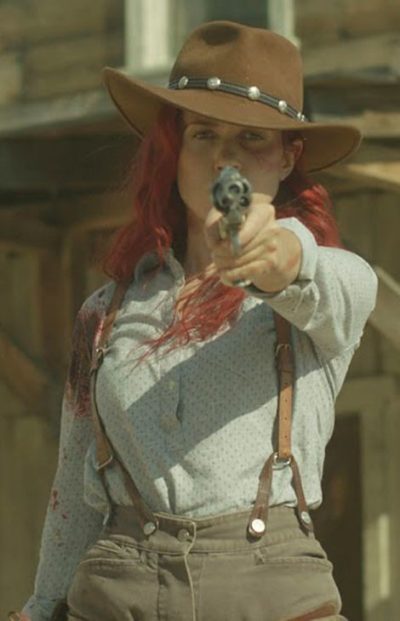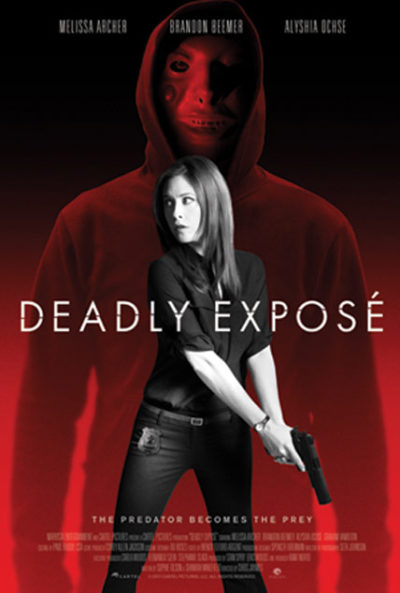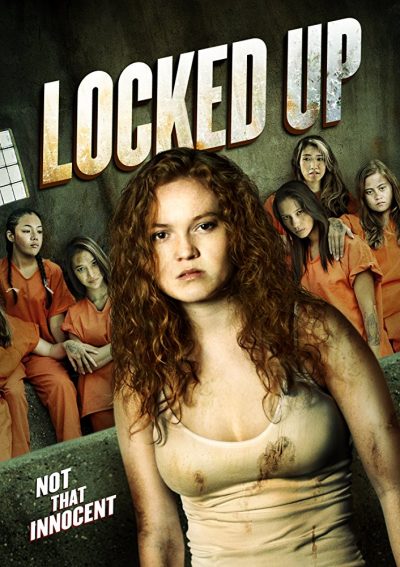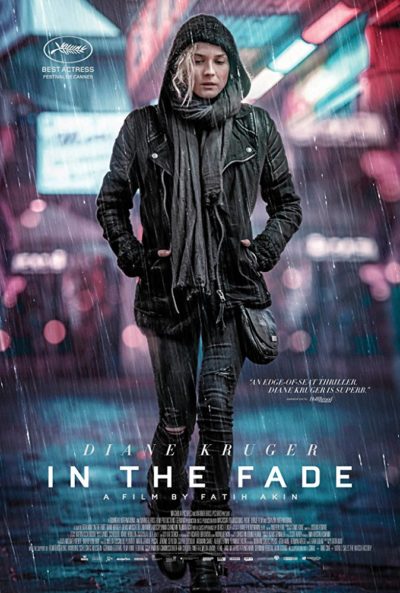★★½
“Mums of Anarchy”
 The leader of all-girl biker gang the Hellcats is brutally beaten and murdered, by Repo (Kosobucki). Her replacement, Kat (Neeld), tries to get to the bottom of the killing, and take vengeance on the perpetrators. Complicating matters is Repo’s position in the Vipers, another motorcycle club with whom the Hellcats have previously had generally friendly relations. Part of that is due to Kat’s on-again, off-again relationship with their leader, Snake (Kabasinski); he also has the advantage of being cosy with some of the local cops, who divert confiscated drugs back to the Vipers for resale. But was he aware of – or did Snake perhaps even order? – Repo’s actions?
The leader of all-girl biker gang the Hellcats is brutally beaten and murdered, by Repo (Kosobucki). Her replacement, Kat (Neeld), tries to get to the bottom of the killing, and take vengeance on the perpetrators. Complicating matters is Repo’s position in the Vipers, another motorcycle club with whom the Hellcats have previously had generally friendly relations. Part of that is due to Kat’s on-again, off-again relationship with their leader, Snake (Kabasinski); he also has the advantage of being cosy with some of the local cops, who divert confiscated drugs back to the Vipers for resale. But was he aware of – or did Snake perhaps even order? – Repo’s actions?
This is a mix of elements that work well, and those that don’t. The characters and performances aren’t bad. Neeld nails the right “do not mess with me” attitude – even if it seemed as if some of her tattoos were rubbing off on occasion! – looking and acting the part required, as well handling the action required better than I anticipate. And normally, a director putting himself in his own film is a red flag which screams “vanity project”, yet Kabasinski is equally solid in his role. Though disturbingly, he reminded me of Axl Rose some of the time. To varying degrees, this compatibility extends throughout the cast, e.g. the cops look like cops. You’d be surprised how often that is not the case in low-budget films.
Yet other aspects come up short. Most obviously: for a biker movie, it has a remarkable lack of… well, bikes. In fact, while I may have blinked and missed it, I don’t think there is a single shot of a Hellcat on, or indeed anywhere near, a motorcycle, at any point in the film. There’s also an ambivalent approach to female nudity. While there are plenty of that low-budget staple, the strip-club scene, the men involved are strikingly bored by it. Which may be the point: yet if they’re not interested, why should viewers be? And Neeld remains resolutely clothed. If you’re going to tout having a Playboy cover-girl in your B-movie… Well, it’s not unreasonable to expect a bit more than (admittedly, impressive!) cleavage.
There are other problems: the scenes don’t flow into one another, and some seem to have needless padding in them. Here’s an example: in one sequence, Kat is being briefed by her lieutenant Stone at a railway station. Six words of meaningful dialogue are preceded by twenty seconds of Stone walking along the platform to reach her boss. In terms of content, there’s simply isn’t enough here for the length, not least because we know from the start who the perpetrator was, significantly reducing the mystery. Sure, there’s a twist, though since even I could see it coming, it won’t be sitting beside The Sixth Sense in cinematic history. Given the obviously limited resources, this still isn’t bad, and I’d not mind seeing more of Neeld. However, my attention was held only intermittently throughout, rather than consistently.
Dir: Len Kabasinski
Star: Lisa Neeld, Len Kabasinski, Deborah Dutch, Mark Kosobucki





 This has the potential to be truly bad, and you need to be willing to look past ropey production values, a possibly deliberately shaky grasp of period (unless “Daisy” really was a popular girls’ name in early medieval times…) and uncertainty as to whether or not this is intended to be a comedy. Yet, I have to admire its “everything including the kitchen sink” approach: throwing together elements from genres as disparate as Vikings, zombies, aliens, sword ‘n’ sorcery and female vengeance shows… well, ambition, at the very least.
This has the potential to be truly bad, and you need to be willing to look past ropey production values, a possibly deliberately shaky grasp of period (unless “Daisy” really was a popular girls’ name in early medieval times…) and uncertainty as to whether or not this is intended to be a comedy. Yet, I have to admire its “everything including the kitchen sink” approach: throwing together elements from genres as disparate as Vikings, zombies, aliens, sword ‘n’ sorcery and female vengeance shows… well, ambition, at the very least. Rarely has such promise been so spectacularly and vigorously squandered. For this starts well enough. In 19th century New Zealand, English ex-pat Charlotte (Eve) is settling into a new life with her husband and newborn child. This is upturned when a midnight raid leaves her husband dead and the baby kidnapped. Months later, after everyone else has moved on, she gets a ransom demand in the mail, and she tracks its source to Goldtown. This remote outpost is truly an Antipodean version of the Wild West, a rough-edged mining town run by Joshua McCullen (Davenport). Braving all manner of threats – not least, that the only other women there are prostitutes – Charlotte makes the perilous journey to the frontier settlement in search of her son.
Rarely has such promise been so spectacularly and vigorously squandered. For this starts well enough. In 19th century New Zealand, English ex-pat Charlotte (Eve) is settling into a new life with her husband and newborn child. This is upturned when a midnight raid leaves her husband dead and the baby kidnapped. Months later, after everyone else has moved on, she gets a ransom demand in the mail, and she tracks its source to Goldtown. This remote outpost is truly an Antipodean version of the Wild West, a rough-edged mining town run by Joshua McCullen (Davenport). Braving all manner of threats – not least, that the only other women there are prostitutes – Charlotte makes the perilous journey to the frontier settlement in search of her son. Josephine “Joe” Cassidy (Eiland) is promised in marriage to Tom (Jenkins), the son of the area’s richest rancher, but her heart actually belongs to Jakob (Grasl), the Indian who is Tom’s adopted brother. The two lovers consummate their relationship when Tom is away, but the spurned fiancee hatches a long-term plan to get revenge. Years later, after becoming the local sheriff, he uses these connections to frame and execute Jakob for murder. Word of this reaches Joe, who conveniently for the plot is handy with a firearm, because her father (Cramer) was a renowned bounty-hunter, and passed on the necessary skills to her. Dying her hair red – hence the title – she sets out to take revenge on Tom, only for him to reveal that Jakob is not dead… Not
Josephine “Joe” Cassidy (Eiland) is promised in marriage to Tom (Jenkins), the son of the area’s richest rancher, but her heart actually belongs to Jakob (Grasl), the Indian who is Tom’s adopted brother. The two lovers consummate their relationship when Tom is away, but the spurned fiancee hatches a long-term plan to get revenge. Years later, after becoming the local sheriff, he uses these connections to frame and execute Jakob for murder. Word of this reaches Joe, who conveniently for the plot is handy with a firearm, because her father (Cramer) was a renowned bounty-hunter, and passed on the necessary skills to her. Dying her hair red – hence the title – she sets out to take revenge on Tom, only for him to reveal that Jakob is not dead… Not  After hacktivists expose the identities of users to a dating site, someone starts targeting the victims, murdering them in ways appropriate to their particular sexual fetish. Detective Maxine Peyton (Archer) leads the investigation, but it soon becomes clear that, as well as acting as a moral judge, jury and executioner, the killer has a particular interest in and connection to Maxine. Potential suspects include over-attached boyfriend and college teacher Simon (Hamilton), her cop partner Nick (Beemer), ex-husband Ryan, or even slutty best friend, Jen (Ochise), who keeps trying to hit on Simon. Might even be e) None of the above. As the bodies continue to mount, Maxine has to find the perpetrator before he/she finds her.
After hacktivists expose the identities of users to a dating site, someone starts targeting the victims, murdering them in ways appropriate to their particular sexual fetish. Detective Maxine Peyton (Archer) leads the investigation, but it soon becomes clear that, as well as acting as a moral judge, jury and executioner, the killer has a particular interest in and connection to Maxine. Potential suspects include over-attached boyfriend and college teacher Simon (Hamilton), her cop partner Nick (Beemer), ex-husband Ryan, or even slutty best friend, Jen (Ochise), who keeps trying to hit on Simon. Might even be e) None of the above. As the bodies continue to mount, Maxine has to find the perpetrator before he/she finds her. It’s not often that a film cost less to make, than the television set on which I watched it. But it appears this was the case here, with the budget reportedly coming in at five hundred pounds. No, there’s not a “thousand” missing from that. £500. What you get is probably not too far from what you would expect for that – some of the aerial photography and locations do appear to represent good value for money. Budget isn’t the real issue here though. This British film’s main problem is the drastic shift in story for the final third, when it suddenly morphs, for no reason, from a SF/thriller, into a full-on zombie apocalypse which the makers have neither the budget nor the talent to depict.
It’s not often that a film cost less to make, than the television set on which I watched it. But it appears this was the case here, with the budget reportedly coming in at five hundred pounds. No, there’s not a “thousand” missing from that. £500. What you get is probably not too far from what you would expect for that – some of the aerial photography and locations do appear to represent good value for money. Budget isn’t the real issue here though. This British film’s main problem is the drastic shift in story for the final third, when it suddenly morphs, for no reason, from a SF/thriller, into a full-on zombie apocalypse which the makers have neither the budget nor the talent to depict. Do not mistake the above rating for suggesting that this is a “good” movie. By most normal standards, it would hardly qualify. But what we have is a throwback to the glory days of exploitation, in particular Filipino women-in-prison flicks like The Big Doll House or
Do not mistake the above rating for suggesting that this is a “good” movie. By most normal standards, it would hardly qualify. But what we have is a throwback to the glory days of exploitation, in particular Filipino women-in-prison flicks like The Big Doll House or  I spent most of the movie going back and forth as to whether or not this qualified for inclusion here. Was its lead, perhaps, just
I spent most of the movie going back and forth as to whether or not this qualified for inclusion here. Was its lead, perhaps, just  Playing like a more social media-conscious version of Heathers, the central characters are high school girls McKayla (Shipp) and Sadie (Hildebrand). They believe their town of Rosedale is the hunting territory of a serial killer, whom the police won’t acknowledge, and the girls have a (not very successful) blog, Tragedy Girls, about the case. The pair succeed in luring out and capturing the killer (Durand), and discover that if they continue operating in his name, they and their site experiences a rise in popularity.
Playing like a more social media-conscious version of Heathers, the central characters are high school girls McKayla (Shipp) and Sadie (Hildebrand). They believe their town of Rosedale is the hunting territory of a serial killer, whom the police won’t acknowledge, and the girls have a (not very successful) blog, Tragedy Girls, about the case. The pair succeed in luring out and capturing the killer (Durand), and discover that if they continue operating in his name, they and their site experiences a rise in popularity.
 This small-scale production – a cast of little more than half a dozen, and one location, not counting the park scenes which bookend it – packs a wallop significantly above its weight. Psychiatrist Jimmy Fonda (Neil) is brought into a military facility by an old friend, Olivia (Andersen), to interview a young girl, Ellie (Liles), who is being held there. To avoid pre-judging her case, Fonda deliberately avoids reading the documentation about her with which he has been provided. But the stringent security precautions (“In the event the subject escapes the restraints, drop to the floor and cover your head”) under which she’s held, should give him a clue that this is far from a normal nine-year-old. If it didn’t, the conversation with her which follows certainly does.
This small-scale production – a cast of little more than half a dozen, and one location, not counting the park scenes which bookend it – packs a wallop significantly above its weight. Psychiatrist Jimmy Fonda (Neil) is brought into a military facility by an old friend, Olivia (Andersen), to interview a young girl, Ellie (Liles), who is being held there. To avoid pre-judging her case, Fonda deliberately avoids reading the documentation about her with which he has been provided. But the stringent security precautions (“In the event the subject escapes the restraints, drop to the floor and cover your head”) under which she’s held, should give him a clue that this is far from a normal nine-year-old. If it didn’t, the conversation with her which follows certainly does.